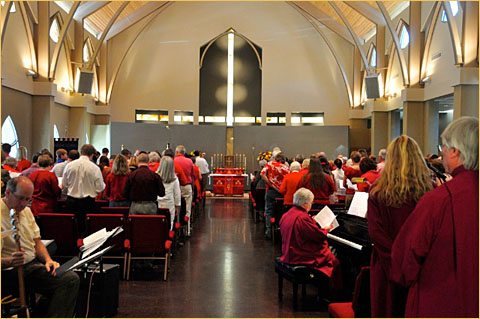|
|
|||
|
|||
ABOUT OSS
|
WHY OPTIMUM SYSTEM SOLUTIONS?Optimum System Solutions (OSS) is a unique consulting firm dedicated to fill a niche in the sound-reinforcement market that has been sorely needed as long as there have been sound systems. For any sound system to properly do its job in a given facility, three things are necessary; 1) it must be designed correctly, 2) it must be installed correctly, and 3) it must be tuned correctly. If any one of the three is not done right, the system’s performance can range from slightly unfulfilling to down right awful! Properly tuning, or commissioning, a sound system, like designing it, can be a very involved procedure, depending on the complexity of the sound system involved. This process always involves setting the gain structure, or levels of all the volume controls within the system, as well as equalizing the system, which is setting the high-resolution tonal balance of the speakers’ frequency response. Commissioning can also include setting the crossover points between high-, mid- and low-frequency speakers, delay alignment between the speakers’ signal arrivals, lobe or beam steering and employing compressor/limiters to provide a louder program level while protect the speakers from damage. The plain truth is that there are many more companies that sell sound systems who claim to be audio experts, than there are companies that actually have the expertise to properly execute an in-depth system design, installation and commissioning. To explain the reasons for this, we need to examine the fundamental structure of the sound installation business in the US. The Players: Any company that sells sound equipment is not a sound-consulting firm, no matter what they tell you or what they call themselves. It is a conflict of interest. Sound contractors make their money selling sound systems. So if you have an existing system with problems, it should be no surprise that their recommended solution will most likely be to replace your existing system with a new one. The Problem: The sound contractor will generally include a few hours labor for a lesser technician to commission the system in his bid price. If the project installation exceeds the estimated labor hours, which happens virtually every time, the commissioning labor at the very end of the project gets cut to the bare minimum. If the system makes noise, they’re done! If a consulting firm designed your system, not a sound-contracting firm calling themselves consultants, and that consulting firm commissioned the system, the chances are that it was probably done correctly. However, the majority of sound systems are “design-build” projects. These projects are done solely by the sound contractor, with no consultant involved. This is the equivalent of having an electrician design a building’s electrical system without an electrical engineering firm working with the architect during the design phase of the facility. If the installing contractor commissioned the system, and this is true for the large majority of systems installed today, your chances are at least 50/50 that it was done incorrectly, if at all. This is not to say that a good sound-contracting firm cannot properly commission a system. The best ones can commission a system as well as any consultant in the business. So, do not think that if your system was not “consultant-commissioned” that it must be re-tuned. If you are happy with its performance, then do not look a gift-horse in the mouth. But if you are not happy with it, perhaps you now know why. Today’s System Integrators: How do we know this? We know this because the founder of OSS, John Murray, has taught professional sound technicians how to commission sound systems for over 20 years. He developed and taught the original sound-system commissioning classes for both INFOCOMM and the NSCA, the dominant educational trade shows for the A/V industry in the US. Most all of his students, primarily system integrators and even some consultants, took his classes when they had already been commissioning systems professionally for years before they learned how to do it correctly. Where does the commissioning of your system fall in that time-line? This is why it is a sad fact that the majority of commercial and professional sound systems are not commissioned properly when they are installed, even if they are well designed. A Lack of Standards: Sound “Engineers:” This leads us to the reason for OSS… One Final Caveat: |
||
| Optimization Before Replacement | |||
 Christ's Episcopal Church Sanctuary, Castle Rock, CO |
|||
CONTACT US:Optimum System Solutions |
|||
|
HOME | ABOUT OSS | SERVICES | REFERENCES | RESOURCES | CONTACT |
|||
Copyright © 2010 Optimum System Solutions. All Rights Reserved. |
|||